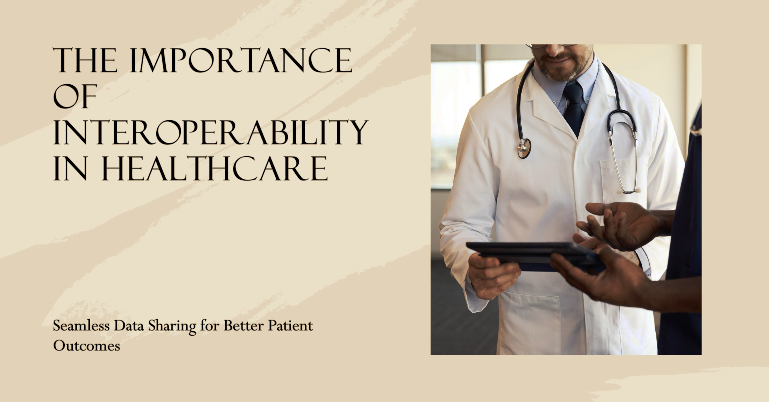
The structure of healthcare systems has been vastly augmented due to technological advancements. Yet, one fundamental aspect, interoperability in healthcare, has emerged as the cornerstone of effective healthcare delivery. Interoperability essentially refers to the capacity of disparate systems, applications, and software involved in healthcare to access, exchange, and work cooperatively with data.
This versatile functionality allows a robust health ecosystem where data flows uninterrupted among health providers, patients, caregivers, and others in the health field. This connectivity profoundly impacts the quality of care, ensuring that essential health information is available at the right time to the right people.
The Imperatives of Healthcare Data Interoperability
The indispensable role of healthcare data interoperability in delivering effective services revolves around enhancing communication at all levels of care. As a bridge between diverse healthcare information systems, interoperability enables the uninterrupted exchange and integration of patient data. This elimination of data silos sets the platform for coordinated and personalized care – an essential factor driving improved patient outcomes.
Healthcare data interoperability supports the critical process of clinical decision-making, enabling better monitoring of disease patterns and more effective implementation of health strategies. By integrating data from varied sources, healthcare professionals are presented with a comprehensive patient picture, thus contributing to significant improvements in health at both individual and community levels.
Evidence-based care greatly benefits from interoperability, as the accurate and up-to-date exchange of information ensures health providers offer the most effective treatments. This way, interoperability is the backbone of our health systems, supporting the drive toward evolving patient needs and expectations.
FHIR Data and Integration in Healthcare Interoperability
Fast Healthcare Interoperability Resources (FHIR) emerges as a critical player in promoting healthcare data interoperability. FHIR curates a standard for health data exchange, thus simplifying the complex process of sharing and managing healthcare information across diverse software applications.
FHIR integration helps establish a common language, ensuring that vital health data is exchanged efficiently, accurately, and securely. This standard connects various health record systems, optimizes interoperability, and builds a consolidated perspective of patient information. FHIR’s potential in augmenting healthcare data interoperability is immense, ensuring data remains accessible whenever required for optimal care.
Interestingly, the realm of FHIR stretches far beyond the simple exchange of electronic health records. FHIR supports the seamless sharing of imaging data, lab results, medications, and allergies, among other critical health developments. Such comprehensive health monitoring and sharing support improved patient care and health outcomes.
The Role of Interoperability in Patient-Centered Care
Patient-centered care represents a major theme in modern healthcare practices. Interoperability bolsters this approach by integrating various health data to provide a holistic view of a patient’s health. By ensuring seamless data exchange, interoperability empowers healthcare providers to deliver patient-specific medical interventions, improving patient satisfaction and outcomes.
Moreover, with interoperability, patients become more engaged in their care, relying on access to health records to make informed decisions about their health. Increasing patient trust and fostering a climate of shared decision-making are additional benefits of integrating interoperability in healthcare.
The Benefits of Interoperability in Healthcare
Interoperability offers many benefits in healthcare, particularly in enhancing healthcare data management. It ensures that data is not only accessible but secure and meaningful for patient care. By demolishing data silos, interoperability fosters collaboration among health partners, improving efficiency and quality of care.
One of the core benefits of interoperability lies in health records management. The integration and real-time update of patient data enabled by interoperability present a holistic view of the patient’s health status. Consequently, clinicians make more informed decisions and health outcomes improve significantly.
Finally, interoperability also contributes to economic sustainability in the healthcare sector. By reducing the duplication of diagnostic tests and procedures, interoperability minimizes healthcare costs. This fiscal efficiency is realized while maintaining, if not enhancing, the quality of patient care – marking a milestone in the journey towards optimal health for all.
Examples of successful healthcare interoperability initiatives
Healthcare interoperability is the ability of different healthcare systems to exchange and use information electronically. This means patients’ medical records can be shared between providers, such as hospitals, doctors’ offices, and pharmacies. This can improve patient care by providing providers with a more complete picture of a patient’s medical history, which can help them make better treatment decisions.
There are several successful healthcare interoperability initiatives around the world. Here are a few examples:
- The Health Information Exchange (HIE) in Indiana, USA: The HIE connects over 100 hospitals and healthcare providers in Indiana. It has helped to reduce redundant tests and improve patient care.
- The National Health Service (NHS) in the UK: The NHS has a national interoperability platform that connects all of the NHS hospitals and GP surgeries in England. This has helped to improve patient care by providing providers with a more complete picture of a patient’s medical history.
- The HealthConnect program in Australia: HealthConnect is a national program that is working to improve interoperability across Australia’s healthcare system. It has developed several standards and guidelines that are helping to make it easier for different healthcare systems to exchange information.
These are just a few examples of the many successful healthcare interoperability initiatives happening worldwide. As interoperability improves, we can expect to see even more benefits for patients and providers.
Here are some additional benefits of healthcare interoperability:
- Improved patient safety: Interoperability can help to reduce errors by making it easier for providers to access and share patient information.
- Reduced costs: Interoperability can help to reduce costs by reducing redundant tests and procedures.
- Increased patient satisfaction: Interoperability can help to improve patient satisfaction by providing patients with a more seamless and coordinated care experience.
As healthcare continues to evolve, interoperability will become increasingly important. Interoperability is essential for providing high-quality, patient-centered care.
Challenges to Achieving Healthcare Interoperability
Achieving healthcare interoperability, the seamless exchange of electronic health information (EHI) between healthcare providers and organizations, remains a complex and ongoing challenge. Despite significant technological advancements and standardization efforts, numerous obstacles hinder the widespread adoption and effective implementation of interoperable healthcare systems.
-
Lack of Standardized Data Formats and Terminology: The absence of consistent data formats and terminology across healthcare systems creates significant barriers to interoperability. Different providers use varying data structures, coding systems, and terminologies to represent patient information, making it difficult to exchange and interpret data effectively.
-
Legacy Systems and Infrastructure: Many healthcare organizations rely on legacy IT systems not designed to support interoperability. These systems may lack the capabilities to integrate with newer technologies and exchange data seamlessly. Upgrading and modernizing these legacy systems can be costly and time-consuming.
-
Data Inconsistency and Accuracy: Healthcare data is often inconsistent, incomplete, and inaccurate due to various factors, including human error, data entry mistakes, and differences in data collection practices. These inconsistencies can lead to misinterpretations and errors in patient care.
-
Privacy and Security Concerns: The sensitive nature of healthcare data raises significant privacy and security concerns. Healthcare organizations must ensure that patient data is protected from unauthorized access, breaches, and misuse. Balancing data sharing and interoperability with patient privacy is a critical challenge.
-
Lack of Financial Incentives and Resources: Implementing and maintaining interoperable healthcare systems requires substantial investments in technology, training, and ongoing support. Healthcare organizations may face financial constraints that hinder their ability to prioritize interoperability initiatives.
-
Organizational Silos and Resistance to Change: Healthcare organizations operate in silos, often with limited collaboration and data sharing practices. Cultural barriers and resistance to change can impede the adoption of interoperable systems and workflows.
-
Lack of Standardized Measurement and Evaluation: There is a lack of standardized methods for measuring and evaluating the impact of interoperability initiatives. Without clear metrics, it is difficult to assess the value and effectiveness of interoperability efforts.
-
Regulatory and Policy Barriers: Complex regulatory frameworks and varying policies across jurisdictions can create obstacles to interoperability. Harmonizing regulations and promoting consistent policies can facilitate data sharing and interoperability.
-
Limited Workforce Expertise: Healthcare organizations may lack the in-house expertise to implement, manage, and maintain interoperable systems. Investing in training and education for healthcare professionals is crucial for enhancing interoperability capabilities.
-
Patient Engagement and Education: Patients play a crucial role in healthcare interoperability, but they may lack awareness of their data sharing options and the benefits of interoperable systems. Educating patients about their data rights and the importance of interoperability is essential.
Overcoming these challenges requires a collaborative effort among healthcare organizations, technology providers, government agencies, and patient advocacy groups. By addressing these obstacles and fostering a culture of data sharing, the healthcare industry can move towards a more connected and efficient healthcare ecosystem.
Conclusion
In conclusion, as healthcare evolves in complexity and scale, interoperability is the linchpin for future developments. It merges the worlds of clinical practice, information technology, health policy, and patient engagement to offer a seamlessly integrated, efficient, and patient-centered healthcare system.
The true power of interoperability lies in its potential to transform every aspect of healthcare—from quality care delivery to research and policy. With its endless potential, healthcare stakeholders must recognize interoperability as an option and a critical determinant of future healthcare success.




